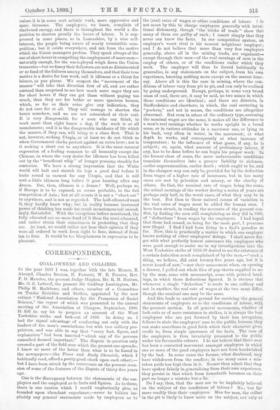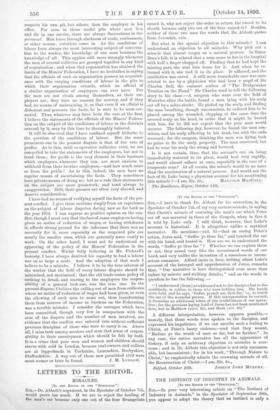. CORRESPONDENCE.
COAL-OWNERS AND COLLIERS.
IN the year 1858 I was, together 'With the late Messrs. E. Akroyd, Charles Buxton, H. Fawcett, W. E. Forster, Rev. F. D. Maurice, the present Judge Hughes, Mr. R. H. Hutton, Mr. G. S. Lefevre, the present Sir Godfrey Lushington, Mr. Philip H. Rathbone, and others, member of a Committee on Trades Societies and Strikes, appointed by the now extinct " National Association for the Promotion of Social Science," the report of which was presented to the annual meeting of the Association at Glasgow, September, 1860. It fell to my lot to prepare an account of the West Yorkshire strike and look-out of 1858. In doing so, I had the signal advantage of conferring not only with the leaders of the men's associations, but with two colliery pro- prietors, and was able to say that "every fact, figure, and explanation" had been inserted " which any of the persons consulted deemed important." The dispute in question only covered a part of the field over which the present one spreads ; I know no more of the latter than what is to be found in the newspapers--(the Times and Daily Chronicle, which I habitually read, afford a pretty good check upon each other),— but I have been struck by the recurrence on the present occa- sion of some of the features of the dispute of thirty-five years ago.
One is the discrepancy between the statements of the em- ployers and the employed as to facts and figures. As to these, there is one caution which I would emphatically give, as founded upon abundant experience,—never to believe im- plicitly any general statements made by employers as to the (real) rates of wages or other conditions of labour. I do not mean by this to charge employers generally with inter tional dishonesty, though "the tricks of trade" show that many of them are guilty of such ; I assert simply that they never can know the facts. In our competitive system, an employer's worst rival is his nearest neighbour employer; and I do not believe that more than very few employers generally, above all in the mining trade, are cognisant—. except through their men—of the real earnings of men in the employ of others, or of the conditions under which they work. The employer will thus be forced habitually to generalise, in any statements on the subject, from his own experience, knowing nothing more except on the merest hear- say. Above all is this the case in mining, where the con: ditions of labour vary from pit to pit, and can only be realised by going underground. Except, perhaps, in some very broad seam of coal, there are, it may be said, no two mines in which these conditions are identical ; and there are districts, in Staffordshire and elsewhere, in which, the coal occurring in "pockets," and not in seams, the conditions are altogether abnormal. But even in mines of the ordinary type, assuming the nominal wages are the same, it makes all the difference to a man's real earnings whether ho works upright in a broad seam, or in various attitudes in a narrower one, or lying on his back, very often in water, in the narrowest; at what depth he works, and consequently at what increase of temperature ; to the influence of what gases, if any, he is subject ; or, again, what amount of preliminary labour, if any, has to be done before he can begin his proper work. In the former class of cases, the more unfavourable conditions translate themselves into a greater liability to sickness, earlier superannuation, earlier death ; which ought to be, and in the cheapest way can only be, provided for by the deduction from wages of a higher rate of insurance, but in too many cases are met by privation and misery, or the charity of others. So that, the nominal rate of wages being the same, the actual earnings of the worker during a series of years are perhaps only half, in the worst cases, of what they may be in the best. But then to these natural causes of variation in the real rates of wages must be added the human ones. I have been struck, in reading the accounts of the present con- flict, by finding the men still complaining, as they did in 1860, of "deductions " from wages by the employers. I had hoped that these had ceased, as being for the most part, I presume, now illegal. I find I had been living in a fool's paradise so far. Now, this is practically a matter in which one employer knows nothing of other employers' doings. I shall never for- got with what perfectly honest assurance the employers who were good enough to assist me in my investigations into the West Yorkshire strike of 1858-59 denied to me the existence of a certain deduction much complained of by the men,—" such a thing, we believe, did exist twenty-five years ago, but it is never heard of now,"—nor their amazement when, on opening a drawer, I pulled out whole files of pay-sheets supplied to me by the men, some with manuscript, some with printed head- ings, in which these deductions figured. It is obvious that whenever a single "deduction" is made in one colliery and not in another, the real rate of wages at the two must differ, though the nominal one may be the same.
And this leads to another ground for receiving the general statements of employers as to the conditions of labour, with the greatest caution. In all general movements, whether of lock-outs or of mere resistance to strikes, it is always the best employers who are put forward by their less scrupulous fellows to state the employers' case to the public, because they can make assertions in good faith which their character gives credit to, from simple ignorance of the facts. The case of the employers is thus invariably presented to the public under too favourable colours. I do not believe that there ever has been a concerted movement amongst employers in which one or more of the good employers have not been hoodwinked by the bad. In some cases the former, when disabused, may have withdrawn from the conflict; in too many cases a mis- taken pride has kept them in it. Sooner than admit that they have spoken falsely in generalising from their own experience, they persist in that which from henceforth becomes on their part no longer a mistake but a lie. Do I say, then, that the men are to be implicitly believed on the subject of the conditions of labour P No ; but far more readily than their employers. Man for man, the collier in the pit is likely to know more on the subject, not only as respects his own pit, but others, than the employer in his office. For even in those model pits where men live and die in one service, there are always fluctuations in the personnel. Men leave through slackness of trade, restlessness, or other causes; outsiders come in. As the conditions of labour form always the most interesting subject of conversa- tion to the worker, the knowledge of one soon becomes the knowledge of all. This applies still more strongly whenever the men of several collieries are grouped together in any kind of organisation; and when that organisation has attained the limits of the Miners' Federation, I have no hesitation in saying that the officials of such an organisation possess an acquaint- ance with the varying conditions of labour in the pits to which their organisation extends, which no official of a similar organisation of employers can ever have. For the men are not rivals among themselves, as their em- ployers are; they have no reasons for secrecy, and if they had, no means of maintaining it, so that even if an official is dishonest and perverts the facts, he is sure to be soon cor- rected. Thus, whatever may have, been the case at the first, I believe the statements of the officials of the Miners' Federa- tion on the subject of the conditions of labour in the districts covered by it, may by this time be thoroughly believed.
It will be observed that I have confined myself hitherto to the question of the conditions of labour. But the more prominent one in the present dispute is that of the rate of profits. As to this, until co-operative collieries exist, we are compelled to take the statements of the employers, but not to trust them ; for profit is the very element in their business which employers, whenever they can, are most anxious to withhold from their brother employers,—and how much more so from the public ! As to this, indeed, the men have no regular means of ascertaining the facts. They sometimes have private means of doing so ; but as a rule their statements on the subject are mere guesswork, and tend always to exaggeration. Still, their guesses are often very shrewd, and deserve consideration.
I have had no means of verifying myself the facts of the pre- sent conflict. I give these cautions simply from an experience on the subject of labour disputes, dating now as far back as the year 1852. I can express no positive opinion on the con- flict, though I must own that the fact of some employers having given no notice of reduction of wages, or having withdrawn it, affords strong ground for the inference that there was no necessity for it, more especially as the reopened pits are mostly the smaller ones, which are generally more costly to work. On the other hand, I must not be understood as approving of the policy of the Miners' Federation in the present conflict. Whilst fully believing in Mr. Pickard's honesty, I have always doubted his capacity to lead a labour war on so large a scale. And the adoption of that scale I believe to be a mistake. I believe it to be the true interest of the worker that the field of every labour dispute should be minimised, not maximised ; that the old trade-union policy of striking in detail, and leaving to the employers the respon- sibility of a general lock-out, was the true one. In the present dispute, I believe the callieg-out of men from collieries where no notice of reduction of wages had been given, or even the allowing of such men to come out, thus transforming them from sources of income to burdens on the Federation, was a terrible mistake. I consider the outrages which have been committed, though very few in comparison with the area of the dispute and the number of men involved, are evidence that the conflict was entered into without sufficient previous discipline of those who were to carry it on. Above all, I miss both among masters and men that sense of respon- sibility to their countrymen which should be felt by both. It is a crime that poor men and women and children should starve with cold in London, because coal-owners and colliers are at loggerheads in Yorkshire, Lancashire, Derbyshire, Staffordshire. A way out of these now permitted civil wars



















































 Previous page
Previous page